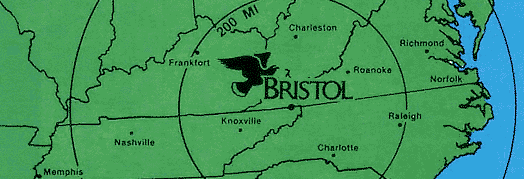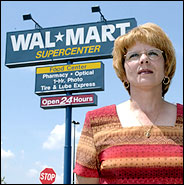
About the Bristol Area
Looking at the above map of the Virginia 9th District I'm concerned with only the counties of Washington, Scott, Smyth, Russell, Buchanan, Dickenson, and Wise Counties Virginia. I'll also include Bristol, VA/TN, Sullivan County with Kingsport, Johnson County with Johnson City, TN. Bristol, Kingsport, and Johnson City are referred to locally as "Tri-Cities. (Not shown) The VA/TN state line divides Bristol and I'll use Bristol as a focal point.
Economy for the region isn't just coal. Only in of Dickenson, Wise, Buchanan, Tazewell, and Russell are mainly the coal industry. Scott, Lee contain some coal but are mainly farming, none in Washington, Smyth which have manufacturing, farming, and Tri-Cities in general is 30% manufacturing, services, and some farming. So it's a varied economy around Bristol that includes mining, farming, manufacturing, and timber. All are low-tech declining industries that require little education. This problem haunts us today.
We have plenty of four-lane roads in most places. US 23 runs from NC through Johnson City, Kingsport, Scott and Wise Counties, Virginia to KY. I-81 runs from near Knoxville to Kingsport, Bristol, Washington, Smyth, Wythe Counties, etc. Also throw US 19, 58, etc in Virginia. And every major town/county in the area (except Dickenson and Buchanan) have four lane roads.
This has failed to make a dent in the economic collapse in the area. There has been almost no development in this whole region that isn't generated by government spending or subsidized at taxpayer expense. The real poverty/unemployment rates are as high as 50% while those without a high school diploma run almost 50% in places.
We have education of all kinds available including East Tennessee State University in Johnson City, Clinch Valley College (part of U. Va.) in Wise, four more private colleges in Tri-Cities and big community colleges in Washington County, Virginia and Sullivan County, Tennessee. These produce several thousand graduates a year yet the region suffers a chronic lack of educated and skilled workers. The average number of college graduates in Tri-Cities is about 12%, down to 6% in Dickenson County, Virginia and surrounding areas.
Education impacts poverty and vice-versa but that alone doesn't account for the staggering illiteracy rates. Most jobs, etc. go to those with political and family connections often shutting out those that do graduate high schools and attend local colleges. This in the end forces many with education, ambition, and skills to flee the region looking for employment outside an area where scarce opportunities are preserved for the local elite, their families, and friends.
This leaves behind an even higher illiteracy and poverty rates, which makes real recovery impossible. Government programs fail because the money is placed under the control of the people causing the problem. More money will not solve the problem only breaking the "good old boy" network and bypassing corrupt local government is the only real solution.

Where do I work now?
Here are some sample newspaper references of our local politicians blaming each other for the mess which they attribute to "not enough spending." They are totally clueless because just obtaining a college degree doesn't mean one can get a job here.
Economic and education issues according to local press reports.
Kingsport literacy group works to improve people's lives
Kingsport Times-News August 31, 1998
If you think illiteracy is a problem that doesn't affect this area, think again. The 1990 census showed that nearly half of the adults living in Tennessee have less than a high school education -- including 32,361 adults in Sullivan County. The Literacy Council of Kingsport is working hard to fill that education gap...
Our View is the Kingsport Times-News editorial and according to this extract from Feb 26, 2001:
Inflation and population growth mean $130 million is needed for TennCare this year, $45 million for higher education, $20 million for the Basic Education Program, $12 million for corrections, $12 million to $14 million for children's services, $12 million to $14 million for mental health and mental retardation and $25 million for the state employees' insurance fund. Even with the addition of these monies, Tennessee will continue to remain behind most neighboring states in practically every socially meaningful category. State lawmakers are fond of saying they are for "responsible'' government. But they have a very narrow definition of the word.
Is it responsible government to be 46th out of the 50 states in per capita spending on K-12 education? Is it responsible government to be 41st in the nation in the percentage of students who graduate high school? Is it responsible government to have the sixth highest high school drop out rate? It's time Tennessee lawmakers started speaking about what they are for. If lawmakers are opposed to an income tax, does that mean they are for higher business taxes in a state that already has some of the highest business taxes in the country?
Or perhaps they prefer to increase what is already one of the highest sales tax rates in the nation. We suppose some lawmakers may want to institute a state property tax while others may want to institute a tax on cars. Whatever form of tax increase they favor, lawmakers need to do something soon or school doors will begin to close and prison doors will begin to open - all for lack of money.
If you believe, as we do, that Tennessee is not doing enough to fund higher education, tell your legislator. If you are ashamed, as we are, of Tennessee's poverty and illiteracy, tell your legislator. If you believe, as we do, that Tennessee is unprepared for the challenges of the New Economy, tell your legislator. And if you believe, as we do, that the answer to Tennessee's problems can be best addressed by structural tax reform, tell your legislator. Now.
Kingsport, Johnson City chambers of commerce endorse state income tax plan
Kingsport Times-News April 23, 2002 (extract)
(still bickering over a state income tax)
Leaders from the Kingsport and Johnson City chambers of commerce announced the result of their studies Tuesday at East Tennessee State University, endorsing tax reform including a low flat-rate income tax.
This state should be expanding its investment in education services, especially for higher education." Both chambers said education is a matter of competitiveness in a global market, but only 16 percent of all adult Tennesseans have a college degree.
That attainment rate dips to 12 percent in Northeast Tennessee, when the national average is 25 percent.
As of 2008 no income tax in Tennessee.
Ramsey discusses Tennessee budget process at Bristol Lions Club meeting
Kingsport Times-News July 19th 2002 (extract)
(Ron Ramsey seems to suggest that all the claims about education being bad in TN is a plot to impose an income tax.)
BRISTOL, Va. - State Sen. Ron Ramsey gave a legislative update to the Bristol Host Lions Club Friday, discussing the events leading up to this year's partial government shutdown and the passing of a $933 million tax increase...
"The thing I hate the worst that's happened over the last two or three years in Tennessee is all of the negative talk and how suddenly when any good news came up, it was suppressed or pushed to the side, yet any bad news was touted," Ramsey said. "It came out we're 43rd in per capita spending on K-12 education. But we ranked 13th in SAT scores across the nation.
"We're about 20th in the high school graduation rate over the last several years with about 89.3 percent of the people graduating." Ramsey said there is a lot of good that can be touted about Tennessee's education system.
"Sure we don't spend per capita what other states spend, but the results that we get are great for that," Ramsey said. "That's what needs to be touted as opposed to exactly how much per pupil we spend." While not trying to be a "conspiracy theorist" or a "doom sayer," Ramsey said all of the negative talk was part of a grand scheme to get the income tax passed in Tennessee...
Note: In VA the Standards of Learning has been touted as a way to end "social promotions" and increase education levels. The political reality is some want to gut the program so the drop-out rate wouldn't be so bad. (As high as 50% in places.) Back to social promotions again. In 2002 they announced this again.
School board: students who fail SOLs might still graduate
Associated Press
IRVINGTON, Va. (AP) - Students who fail graduation exams could still receive their diplomas, provided they have a strong academic record, under a proposal that has won the preliminary approval of the Virginia Board of Education.
The proposal would allow local school boards to award graduation credits to students whose performance on the state Standards of Learning tests "is inconsistent with other recognized indicators of academic achievement." Board members previously approved using exams such as Advanced Placement and International Baccalaureate tests as substitutes for the SOLs. But Thursday's vote marked the first time the board has opened the door to allowing forms of student assessment other than tests.
Board President Kirk T. Schroder said he and board members would issue more concrete guidelines after a study by a special advisory committee. "What this does is protect concerns for what I believe is only a small population of students who may not be good test-takers, but who can show evidence that they've mastered the skills," Schroder said.
Virginia is one of about 20 states that has, or is developing, graduation exams demanding at least 10th-grade level skills. Virginia's rules, adopted by the state board three years ago, call for students to pass at least six high school SOL tests in order to graduate, starting with the class of 2004.
Supporters say standardized tests are the best way to measure students' grasp of the curriculum. Opponents say no one should be denied a diploma based on test results alone, and that classroom performance also must be considered.
2000 Associated Press.
Published April 29, 2000
- Bristol Loses Another 185 Jobs State Workers in Poverty
- Will Bristol Virginia become a toxic waste dump with Nulife Glass?
- Job Market Continues to Implode in Tri-Cities Bristol in 2015
- Crime by Race in Virginia 2012
- Raising Taxes to Pay Police While Looting Public Funds
- Bristol-Southwest Virginia Lost Another 2800 Residents Since 2010
- Tax Break for Stupid Country Music Museum Schools Go Without
- The demise of the Virginia coal industry
- What about some solutions for Southwest Virginia?
- Social Breakdown in Tri-Cities Virginia Tennessee
- Republicans push corporate welfare for the coal industry
- Youth unemployment in Bristol Tri-cities continues to explode
